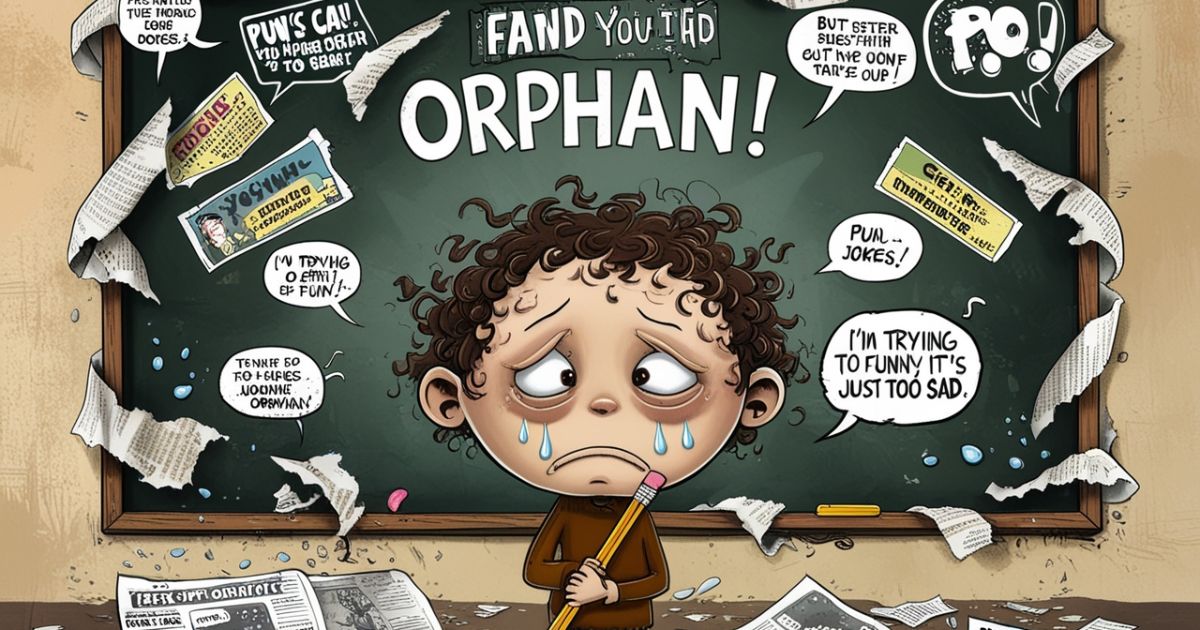Orphan puns are humorous wordplays that rely on dark humor related to orphans or the absence of parents. These jokes about being adopted often play on the unfortunate circumstances of children without families, walking a fine line between comedy and sensitivity. Though potentially controversial, these family jokes have found their niche among those who appreciate edgy humor that challenges social comfort zones.
Are you ready for witty puns that will make you simultaneously chuckle and cringe? 150 Best Orphan Jokes delivers exactly that emotional rollercoaster. These cleverly crafted funny yet sad jokes hit your funny bone first before tugging at your heartstrings. The contrast between laughter and tears creates a unique comedic experience that many find strangely compelling and memorable.
The collection “150 Best Orphan Puns So Bad They’ll Make You Laugh Then Cry” features carefully selected wordplay humor ranging from mild to outrageous. Each pun in this orphan joke collection was chosen for its ability to elicit that distinctive mix of amusement and discomfort. The jokes vary in style and delivery but share the common theme of orphan-related humor that manages to be simultaneously awful and awfully funny.
Best Orphan Puns So Bad They’ll Make You Laugh Then Cry
- I tried to write an autobiography about an orphan, but I had to leave out the beginning.
- Why did the orphan refuse to play hide-and-seek? Because he always felt like he was already found.
- What’s an orphan’s favorite type of music? Soul.
- An orphan walks into a library and asks for books about his family tree. The librarian replies, “They’re all in the fiction section.”
- My friend told me he was adopted. I told him, “That’s okay, I’m an original.”
- I told my orphan friend a joke about a family. He didn’t get it.
- An orphan’s favorite game? Solitaire.
- Heard about the orphan who became a baker? He had no roots, but he knew how to rise.
- I saw an orphan trying to build a house of cards. I told him, “It’s okay, everyone has trouble building a stable family.”
- Why was the orphan a terrible gardener? He had no one to help him sow seeds.
- What did the orphan say when he saw a family of ducks? “Lucky ducks!”
- The orphan opened a restaurant and called it “No Home Cooking.”
- My friend is an orphan and a magician. He always pulls out the same trick: “Disappearing parents.”
- An orphan applied for a job at the genealogy company. They told him, “Sorry, your background check is blank.”
- I asked an orphan if he had a favorite holiday. He said, “Any one that comes with a family-sized meal.”
Orphan Puns: A Humorous Look at a Sensitive Topic
- Dark humor puns help many people process difficult emotions about serious topics.
- Orphan jokes use wordplay related to children without parents or guardians.
- People enjoy these clever jokes because they combine unexpected elements in surprising ways.
- Humor often serves as a coping mechanism for topics society finds uncomfortable.
- The best witty orphan puns balance sensitivity with clever linguistic connections.
- Comedians often use this type of comedy about family loss to challenge social norms and expectations.
- Many people find relief in laughing at subjects that normally cause sadness.
- Comedy wordplay creates distance that allows people to engage with difficult topics.
- The contrast between the subject matter and humor creates a unique tension.
- These parentless jokes work because they subvert expectations in unexpected ways.
- Orphan humor exists in a long tradition of comedy that addresses tragedy.
- People bond over shared laughter even when the topic seems inappropriate.
- The best puns in this category rely on clever linguistic connections rather than cruelty.
- Jessica from Puns About Puns carefully crafts these jokes to hit the right balance of funny and thoughtful.
- Many self-deprecating humor jokes play on common phrases with double meanings.
- The element of surprise makes these puns memorable to audiences.
- Some people use this humor to reclaim power over difficult childhood experiences.
- Laughter provides emotional release when thinking about challenging subjects.
- Cultural context significantly influences which jokes people find acceptable.
- The line between funny and offensive varies greatly among different individuals.
Adopting Orphan Puns: Finding the Laughter
- Wordplay about adoption creates opportunities for clever linguistic connections.
- People often remember pun-based comedy that connects unexpected ideas in surprising ways.
- The best adoption jokes highlight the positive aspects of creating new families.
- Humor helps normalize discussions about different family structures.
- Many people use these lost family jokes to process their own experiences with adoption.
- Comedians with personal connections to adoption often create the most insightful material.
- Laughter brings people together around topics that might otherwise feel uncomfortable.
- Puns about finding homes play with double meanings in creative ways.
- The contrast between serious topics and playful language creates memorable jokes.
- Many funny orphan wordplay jokes celebrate the formation of loving families through non-traditional means.
- Wordplay in this category often centers on themes of belonging and identity.
- The element of surprise makes these jokes especially effective.
- People share these puns to break tension around sensitive family discussions.
- Humor serves as an entry point for more serious conversations about adoption.
- Clever jokes avoid mockery while still finding humor in unique situations.
- Comedians use these puns to challenge stereotypes about family structures.
- Many people with adoption experience appreciate thoughtful humor on the subject.
- The best jokes in this category celebrate the joy of finding permanent homes.
- Orphan meme humor about adoption often highlights the positive transformation in children’s lives.
- Laughter creates bonds between people with shared experiences of adoption.
- These jokes work best when they come from a place of understanding and compassion.
Orphan Jokes: Navigating the Line Between Funny and Heartfelt
- Comedians must balance humor with sensitivity when crafting orphan jokes.
- The best hilarious puns about orphans acknowledge the emotional reality while still finding humor.
- Many successful jokes focus on resilience rather than misfortune.
- Wordplay allows people to address difficult topics through indirect means.
- Effective orphan humor avoids mocking actual orphans or their circumstances.
- Audiences respond best to jokes that come from a place of understanding.
- Skilled comedians use these jokes to highlight social issues in accessible ways.
- The intention behind the joke matters as much as the content itself.
- Humor serves as a bridge between difficult emotions and everyday conversation.
- People appreciate dad jokes that acknowledge both the laughter and tears in life.
- Comedians with personal connections to the topic often create the most authentic material.
- Successful jokes create moments of shared understanding among diverse audiences.
- The best orphan humor contains elements of hope alongside the comedy.
- Timing plays a crucial role in determining whether a joke succeeds or fails.
- Comedians must read their audience carefully when delivering sensitive material.
- Laughter often serves as release for topics society finds difficult to discuss directly.
- Great jokes in this category avoid stereotypes while acknowledging realities.
- Many people use humor to process their own complex feelings about family.
- Comedians who succeed in this area understand both comedy and compassion.
- The finest jokes leave audiences feeling uplifted rather than uncomfortable.
- These puns work best when they celebrate resilience through adversity.
The Psychology Behind Orphan Humor: Why We Laugh
- Psychologists identify humor as a defense mechanism against uncomfortable feelings.
- People use laughter to process emotions too difficult to face directly.
- Our brains experience relief when tension dissolves through unexpected humor.
- Researchers note that dark humor can indicate psychological resilience.
- Laughter triggers endorphin release that counteracts negative emotions.
- Studies show that humor helps people address topics they might otherwise avoid.
- Shared laughter creates community bonds even around difficult subjects.
- Our minds appreciate the cognitive challenge of resolving incongruity in jokes.
- Psychologists observe that humor often develops as a coping skill in childhood.
- People with personal experience of hardship often develop sophisticated humor.
- Research indicates that humor helps maintain psychological distance from trauma.
- The surprise element in good puns activates pleasure centers in our brains.
- Humor serves as a social tool that facilitates discussions about taboo subjects.
- Studies demonstrate that laughter improves overall mental wellbeing.
- Our brains process jokes through multiple cognitive and emotional pathways.
- Psychologists find that humor often emerges as a healing response to difficulty.
- People laugh as a biological signal that perceived threats hold no danger.
- The cognitive shift in understanding puns provides intellectual satisfaction.
- Research shows that humor helps people integrate difficult experiences into their life stories.
- Laughter creates temporary freedom from social constraints and expectations.
- Humor helps transform painful experiences into manageable narratives.
Read This Post: 210+ Funny Corn Puns And Jokes: Corny Giggles
Orphan Puns and Wordplay: A Linguistic Exploration
- Linguists study puns as examples of dual meaning creation in language.
- Orphan puns typically rely on homonyms or words with multiple interpretations.
- The brain experiences pleasure when resolving the linguistic puzzle in puns.
- Language allows us to transform serious topics into playful communication.
- Most witty puns play with expectations through creative word associations.
- Linguists classify these jokes based on their phonetic and semantic structures.
- The surprise element in good puns creates cognitive satisfaction.
- Many languages contain similar wordplay humor around family-related topics.
- Researchers note that puns require sophisticated language processing abilities.
- Successful comedy wordplay depends on shared cultural understanding among listeners.
- Language provides tools for addressing difficult topics through indirect means.
- The best puns contain multiple layers of meaning for audiences to discover.
- Many orphan jokes rely on metaphors that connect unexpected concepts.
- Linguists observe that humor often emerges at the boundaries of language rules.
- Cultural context significantly influences which puns people understand and appreciate.
- Wordplay functions as a social tool that builds connections through shared knowledge.
- Children develop appreciation for puns as their language skills mature.
- Different cultures have unique traditions of wordplay around family structures.
- Language allows complex emotional topics to become accessible through humor.
- The satisfaction of “getting” a pun creates positive associations with difficult topics.
- Puns serve as linguistic bridges between emotional reality and social conversation.
Orphan Jokes in Popular Culture: From Literature to Film
- Authors have incorporated orphan characters in stories throughout literary history.
- Charles Dickens featured numerous orphan protagonists in his influential novels.
- Many classic fairy tales center on orphaned children facing various challenges.
- Filmmakers often use orphan characters to create instant audience sympathy.
- The orphan archetype appears consistently across diverse cultural storytelling traditions.
- Harry Potter represents one of the most famous orphan characters in modern literature.
- Comedians frequently reference orphan themes when discussing resilience and identity.
- Superhero stories commonly feature orphaned protagonists like Batman and Superman.
- Annie stands as perhaps the most recognized orphan character in American musical theater.
- Writers use orphan characters to explore themes of self-discovery and belonging.
- The orphan narrative creates natural opportunities for character growth and development.
- Popular culture often portrays orphans as uniquely resourceful and independent.
- Filmmakers utilize orphan backgrounds to justify unusual skills or character traits.
- Literary scholars identify the orphan journey as a fundamental storytelling pattern.
- Many coming-of-age stories begin with the protagonist losing parental guidance.
- Authors use orphan characters to examine social structures and support systems.
- The contrast between orphan hardship and eventual triumph creates compelling narratives.
- Television shows frequently incorporate orphan backstories for complex characters.
- Comedians draw on these established cultural references when crafting orphan jokes.
- Orphan narratives in popular culture influence how society views real-life orphans.
- These stories shape public understanding of adoption and alternative family structures.
Crafting Clever Orphan Puns: Tips and Tricks
- Writers should focus on wordplay rather than mocking actual circumstances.
- The best witty puns contain multiple layers of meaning for audiences to appreciate.
- Effective orphan jokes often incorporate themes of resilience and strength.
- Comedians recommend starting with common phrases that allow dual interpretations.
- The element of surprise creates the most memorable humorous moments.
- Writers should avoid jokes that rely solely on stereotypes or misconceptions.
- Wordplay humor works best when it challenges expectations in unexpected ways.
- Successful puns often connect seemingly unrelated concepts through clever language.
- Testing jokes with diverse audiences helps identify potentially problematic material.
- Humor writers should research the subject to ensure jokes reflect reality accurately.
- The finest puns balance linguistic cleverness with emotional sensitivity.
- Writers benefit from considering multiple interpretations of their material.
- Comedians emphasize the importance of delivery and timing for sensitive topics.
- Effective humor acknowledges difficult realities while finding genuine humor.
- The context of presentation significantly impacts how audiences receive jokes.
- Writers should evaluate whether their jokes punch up rather than down.
- Personal connection to the subject often results in more authentic humor.
- The best orphan puns transform challenging topics into moments of connection.
- Comedians stress the importance of authentic compassion behind the humor.
- Skilled writers use puns to illuminate truth rather than obscure it.
- Effective humor creates space for both laughter and thoughtful reflection.
Ethical Considerations When Using Orphan Jokes: A Guide
- Comedians must consider the potential impact of their jokes on people with lived experience.
- Context matters significantly when determining the appropriateness of orphan humor.
- Jokes work best when they avoid reinforcing harmful stereotypes about orphans.
- Writers should question whether their humor comes from a place of understanding.
- The intention behind the joke influences how audiences receive the material.
- Ethical humor avoids causing harm to vulnerable communities or individuals.
- Comedians benefit from learning about the realities of orphan experiences.
- Self-awareness about privilege helps creators avoid exploitative or insensitive humor.
- The best jokes welcome orphans into the laughter rather than making them the target.
- Researchers observe that humor from within communities differs from outside perspectives.
- Consider whether the joke might perpetuate misconceptions about orphans or adoption.
- Ethical humor recognizes the humanity and dignity of the people involved.
- Writers should reflect on whether their jokes could cause pain to affected individuals.
- The power dynamic between joke-teller and subject requires careful consideration.
- Humor works best when it creates connection rather than division.
- Comedians with personal connections to adoption often create more nuanced material.
- Ask whether the joke celebrates resilience or mocks vulnerability.
- Ethical humor acknowledges complexities rather than oversimplifying experiences.
- Writers should seek feedback from people with relevant lived experiences.
- Consider whether the joke would feel appropriate if told directly to an orphan.
- The most ethical humor creates space for both laughter and deeper understanding.
Conclusion
The “150 Best Orphan Puns So Bad They’ll Make You Laugh Then Cry” represents a unique collection of humor that walks the delicate line between comedy and compassion. These carefully selected jokes showcase the power of wordplay to transform difficult topics into moments of shared laughter and understanding.
The collection demonstrates how humor serves as a valuable tool for processing complex emotions and addressing subjects that might otherwise remain uncomfortable to discuss. Each pun in this compilation aims to balance clever linguistic connections with genuine sensitivity toward the real experiences of orphans and adoptive families.
Ultimately, the value of “150 Best Orphan Puns So Bad They’ll Make You Laugh Then Cry” extends beyond mere entertainment. This collection invites readers to experience both laughter and tears, creating space for meaningful conversations about family structures, resilience, and human connection.
The jokes succeed precisely because they acknowledge both the humor and heartache present in challenging circumstances. Through thoughtful wordplay and careful attention to ethical considerations, these puns demonstrate how comedy can illuminate difficult topics without diminishing their importance. The collection reminds us that laughter often serves as a bridge to deeper understanding and compassion.

Hello, I’m Daisy Sadie, a writer at Azaadpuns. I explore the dynamic world of puns and wordplay, delivering captivating linguistic twists that will make you laugh and groan. Join me on Azaadpuns.com for the latest in clever wordplay that makes language fun again.

